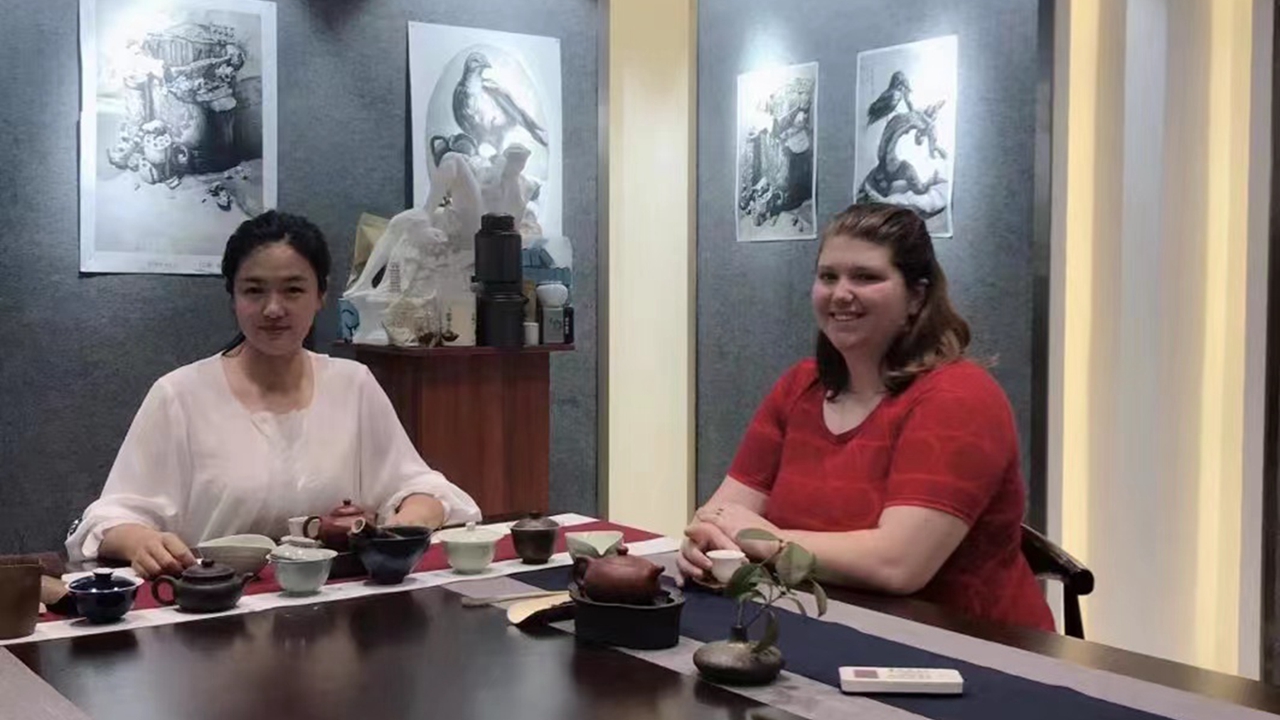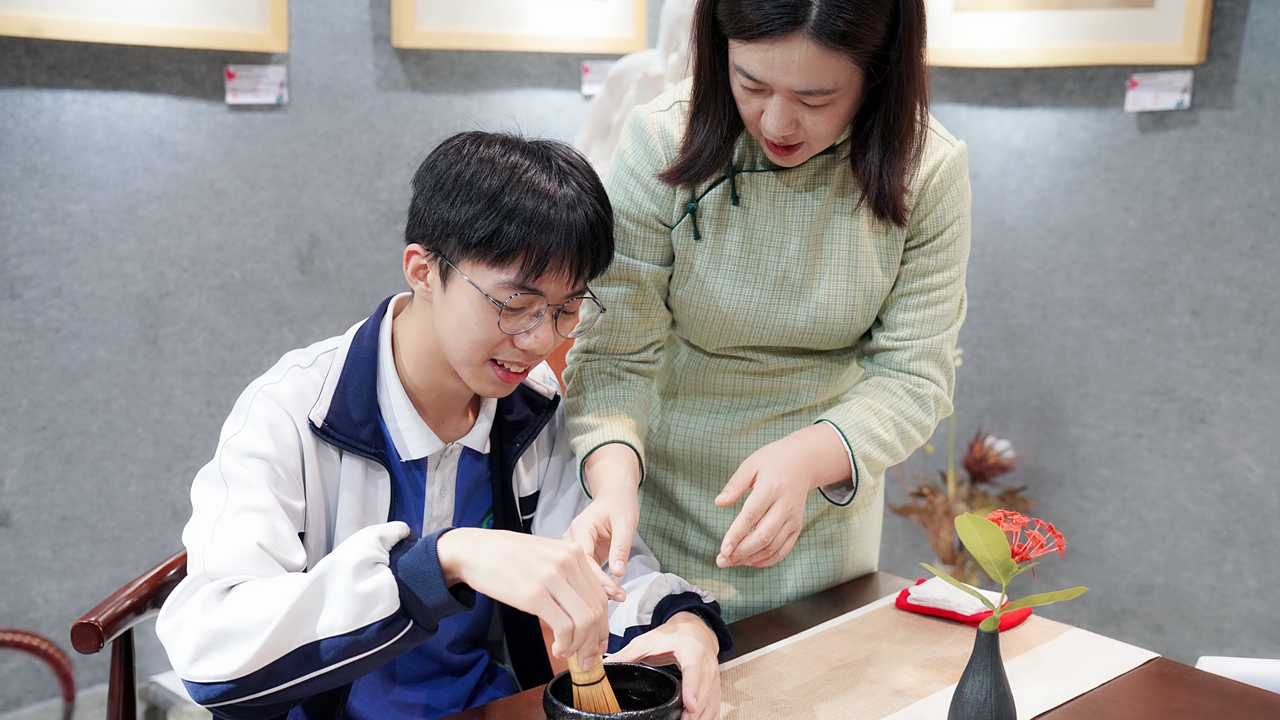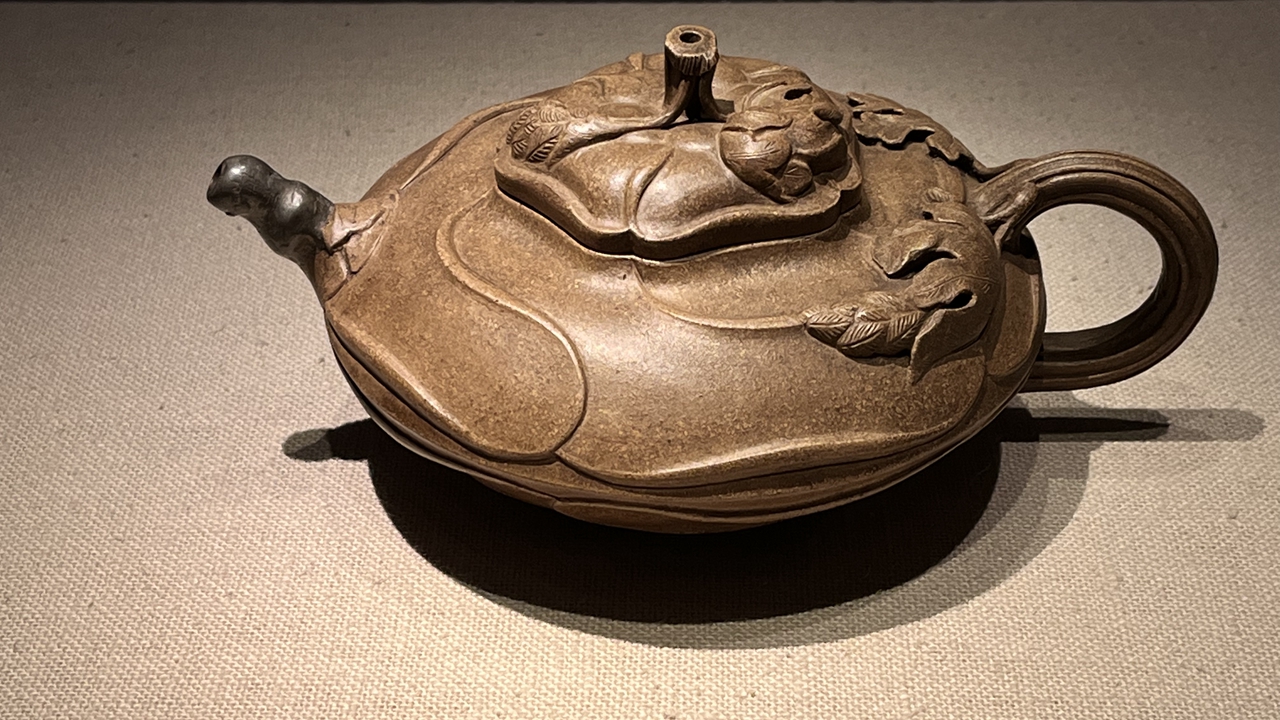Young teacher promotes Chinese art through tea
Writer: Lin Songtao | Editor: Zhang Chanwen | From: Shenzhen Daily | Updated: 2023-03-28
A+ A- Print
Video by Lin Songtao
Zhang Quan, an art teacher from Pinghu Foreign Language School in Longgang District, is keen on promoting Chinese art in life and work.
Zhang Quan boils the tea at Pinghu Foreign Language School. Photos by Lin Songtao except otherwise stated
When she obtained her master’s degree in 2012, Zhang firmly chose Shenzhen to realize her dream of becoming a teacher. “I really love the city as it’s young and energetic.”
Not long after Zhang started working at the school, she became very good friends with some of her foreign colleagues. She helped solve problems they encountered, such as taking one of her expat colleagues to the hospital when he fell ill.
Zhang Quan (2nd clockwise from L) teaches a tea art lesson for teachers at Pinghu Foreign Language School.
Zhang, who majored in art, tried to convey Chinese traditional art to her foreign colleagues. “I know many foreigners are interested in Chinese art and I want them to have a platform to learn about it.”
She taught Chinese art history for foreign teachers. “I introduced stories about Zhu Da, a renowned painter in the Qing Dynasty (1644-1911), and one of the teachers was so moved that she even asked me to have Zhu’s signature,” she said.
Zhang realized that many foreigners were indeed passionated in Chinese art and thought that she could convey more about Chinese art by tea. “My foreign colleagues can first drink a cup of tea, then I will tell them stories about Chinese artists. This is enjoyable as they feel art by smelling, touching and thinking,” Zhang added.

Zhang Quan teaches a student Japanese matcha tea ceremony. Courtesy of Zhang Quan
She had an idea to make videos to promote tea art for a long time, but she didn’t do it until she had a chance in 2019. “A project by the Longgang Literary Federation needed to produce a program. So, I shot a short video about making a Zisha (purple clay) teapot. It took a long time to edit since making the teapot required a lot of effort and various processes. Afterward, I felt a sense of achievement doing the video and I started thinking about doing more. Plus, having an English narration helped the audience understand.”
Zhang has an independent workshop space for her tea art classes in school. “I began researching about tea art in 2009 and followed my tutor to do related work when I was taking my master’s degree. I also took specialized classes, and in 2018, I raised the idea to launch a tea art class in school and the school immediately agreed,” she said.

Zhang Quan teaches a student Japanese matcha tea ceremony. Courtesy of Zhang Quan
Currently, Zhang teaches tea art to students on Mondays and to teachers on Fridays. “Thanks to the school’s support, I can share my hobbies and have a chance to present myself. I’m fully happy,” she said. Her tea sets for the teachers were purchased by the school and she bought other teaware herself. She also teaches international tea art lessons such as the Japanese matcha tea ceremony.
“At first, I felt like my class was a little boring, but on one occasion I got sick and let the students make the tea by themselves. Surprisingly, I found them very eager, and one even brought a camera. Some of them videotaped others making tea, while others were just watching. The class turned more interactive,” she recalled.
Since then, she has welcomed her students to shoot photos and videos during class. “Sometimes, I just show them how to make tea and I would let one student do it and another film it. This would encourage them to study harder. In addition, they would share this on their WeChat Moments and they look forward to the next lesson. They were happy and learned a lot,” she said.
Zhang is proud of spreading cultural knowledge to those around her, including students, teachers and foreign friends. “It will be an achievement if I can inspire expats to know more about Chinese art. I hope I can also help other teachers relax using my course to take a break from their hard work.”
She expressed her strong wishes to invite expats to join in art lessons in her school. “I can teach tea art, Zisha handicraft making and art history; other teachers can have calligraphy, woodblock paintings and Chinese paintings lessons in the workshop. Shenzhen Daily is an excellent platform that gathers foreigners, and I really hope there’s a chance that we can communicate further with expats in the city. I never thought about what the result would be, but if this can be done I’ll be satisfied enough. It’s my big dream.”

A Zisha tea pot. Courtesy of Zhang Quan
A Zisha plate. Liu Chaolin
Zhang speaks highly of Shenzhen’s cultural and art development. “Most of the schools in the city have their own distinct arts and culture classes. Also, more museums are holding national and international-level exhibitions, such as the Dunhuang exhibition in collaboration with the Dunhuang Academy in the Shenzhen Museum last year as well as Raphael’s paintings featured in the Nanshan Museum. These benefit citizens a lot,” she explained.
As the deputy secretary general of the Longgang Artists Association, Zhang usually takes part in planning and commenting on exhibitions. “I can take expat friends to exhibitions and explain exhibits to them.”
“For many years, I have kept working hard towards my goal steadily. I continue to try to do something that makes myself and people around me proud,” Zhang said.